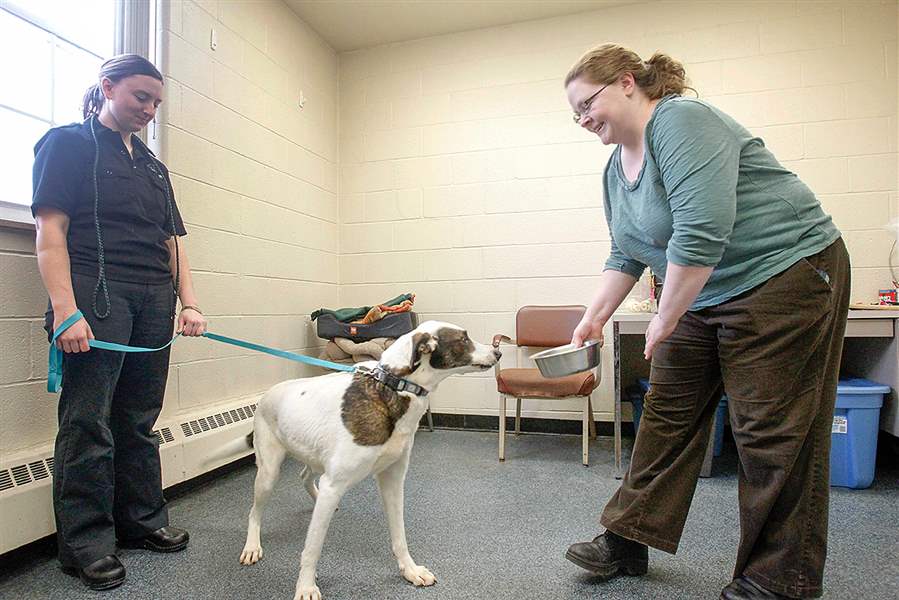
Dogs still die despite vow for change
Foes prod Contrada on her promise to save food guarders
2/26/2014
Julie Lyle, Lucas County Dog Warden, says she plans to continue killing food-guarding dogs and that she refuses to attempt to modify their behavior by giving them access to additional food, a step that national canine experts say could easily stop food-guarding.
THE BLADE
Buy This Image
After promises by Lucas County Commission President Carol Contrada that changes would be implemented at the county dog shelter that would reduce the killing of dogs who guarded their food bowls, county officials on Tuesday announced only a minor change that does not reduce the killing of such dogs.
There was no commitment to stop the killing of hungry dogs who growl or attempt to bite when pound workers pull their food bowls away.
In fact, statements by shelter director Julie Lyle on Tuesday indicate she plans to continue killing food-guarding dogs and that she refuses to attempt to modify their behavior by giving them access to additional food, a step that national canine experts say could easily stop food-guarding.
The decision to continue killing hundreds of dogs at the Lucas County Canine Care & Control Center downtown by Ms. Lyle because she refuses to attempt to modify their behavior is quickly becoming a political issue in this year’s race for county commissioner.

Contrada
Ms. Contrada, a Democrat who barely won her first term in a contested race over spoiled provisional ballots, is facing a primary challenge from a fellow Democrat, as well as two Republican opponents. Two of her three challengers told The Blade Tuesday she is mishandling the controversy at the county dog shelter.

Hood
Michael Hood, a long-time Spencer Township trustee who is Mrs. Contrada’s Democratic competition in the May primary, said he does not believe dogs who guard their food should be labeled “aggressive” and the killing of dogs should always be the very last resort for any dog at the shelter.
“Everything needs to be tried prior to putting an animal down. I’m a firm believer of that,” he said. “I think that as much as humanly possible, there should be some type of modification. You don’t just bail and give up on an animal and put it down. I don’t like that approach.”

Haddad
Kevin Haddad, a former Sylvania Township trustee who is running on the Republican ticket, said no dog should be killed for behavior problems without any attempt to help it change its ways.
“Dogs are like anything else in the world. Once you’re trained some way, even as humans, that’s they way you live your life,” he said. “You have to work with training them. If a dog cannot be trained, then you have to do what you have to do. ... This should have been addressed way before now.”
The third candidate, Republican Ben Roberts, did not return a phone call for comment.
Even as political criticism rose on Tuesday, Ms. Contrada and Lucas County officials announced a minor step toward changing a food-guarding test policy at the county shelter that often means a death sentence for dogs.
The commissioners endorsed a change implemented by Ms. Lyle for the way a standard behavior evaluation is conducted for dogs who object to having people interfere with their food. The existing procedure has been to discontinue the assessment immediately if a dog froze, growled, or tried to bite over a food bowl, which in most cases resulted in the dog being killed.
“We’re going to complete the assessment on every dog that we can handle,” Ms. Lyle said.
The seven portions of the behavior evaluation, called the Safety Assessment for Evaluating Rehoming, or SAFER for short, are always conducted in the same order. The test is used at the county shelter to determine whether a dog is suitable for adoption.
The first four portions assess a dog’s tolerance of handling by humans. The food-guarding evaluation is the fifth portion, followed by toy behavior and dog-to-dog behavior. Ms. Lyle said the change this week allows for the assessment to continue even if the dog exhibits some aggressive behavior during the food portion of SAFER. But it does not affect a decision to stop the evaluation if a dog does poorly on other areas of the assessment.
Ms. Lyle said discussions are ongoing about other potential changes, including options with the county shelter’s transfer program and whether the county shelter can introduce any kind of behavior modification training.
“We don’t have anything in place yet that I’m able to talk about,” Ms. Lyle said. “We’re exploring some programs and options. We’ve got our transfer program that we’re looking at what other options we may have there, what we can do to help our current partners take more dogs. That’s one example.”
In the meantime, dogs who may guard their food and who aren’t taken by another rescue group will be killed at the shelter, she said. On Sunday, a 1-year-old male bluetick hound was killed for freezing and/or growling over a food bowl during his evaluation the day before. He had entered the shelter Feb. 13 after running loose on Roseview Drive in Toledo.
He was the second 1-year-old dog killed since Ms. Contrada said the county was reviewing the food-guarding policy and promised changes.
The county shelter has never offered any formal behavior-modification training for any type of problem. When dogs fail behavior tests, they are killed.
National and local experts say free feeding, which involves giving dogs access to food at all times, thereby making it a less valuable resource, is successful in the vast majority of cases within a period as short as 48 hours.
Despite Mrs. Contrada’s statements to The Blade on Monday saying free feeding would be one of the changes recommended at the shelter for dogs who display potential guarding issues, Ms. Lyle said the technique does not “do enough to ensure community safety.”
“We don’t feel that just by free-feeding a dog for a few days, that that’s ensuring public safety,” Ms. Lyle said. “All dog behavior is fluid, and sometimes very context-specific. If a dog exhibits aggressive behavior and then doesn’t later, that doesn’t guarantee that everything is fine. It doesn’t mean the behavior is gone, it means they’re not showing it to you at that moment.”
So far county officials, including Ms. Contrada, are backing their dog warden and allowing her to continue the killing of dogs by the hundreds each year.
Contact Alexandra Mester: amester@theblade.com, 419-724-6066, or on Twitter @AlexMesterBlade.